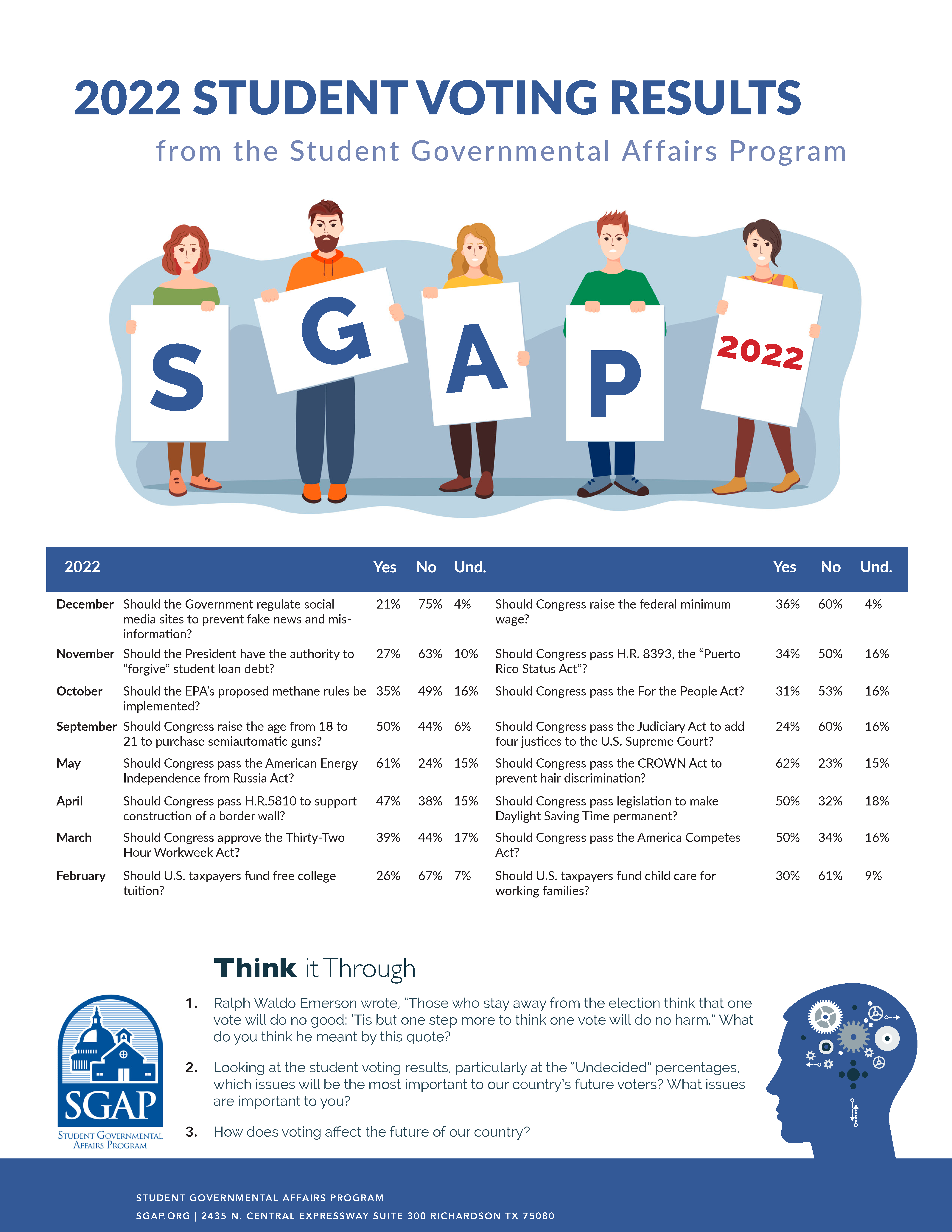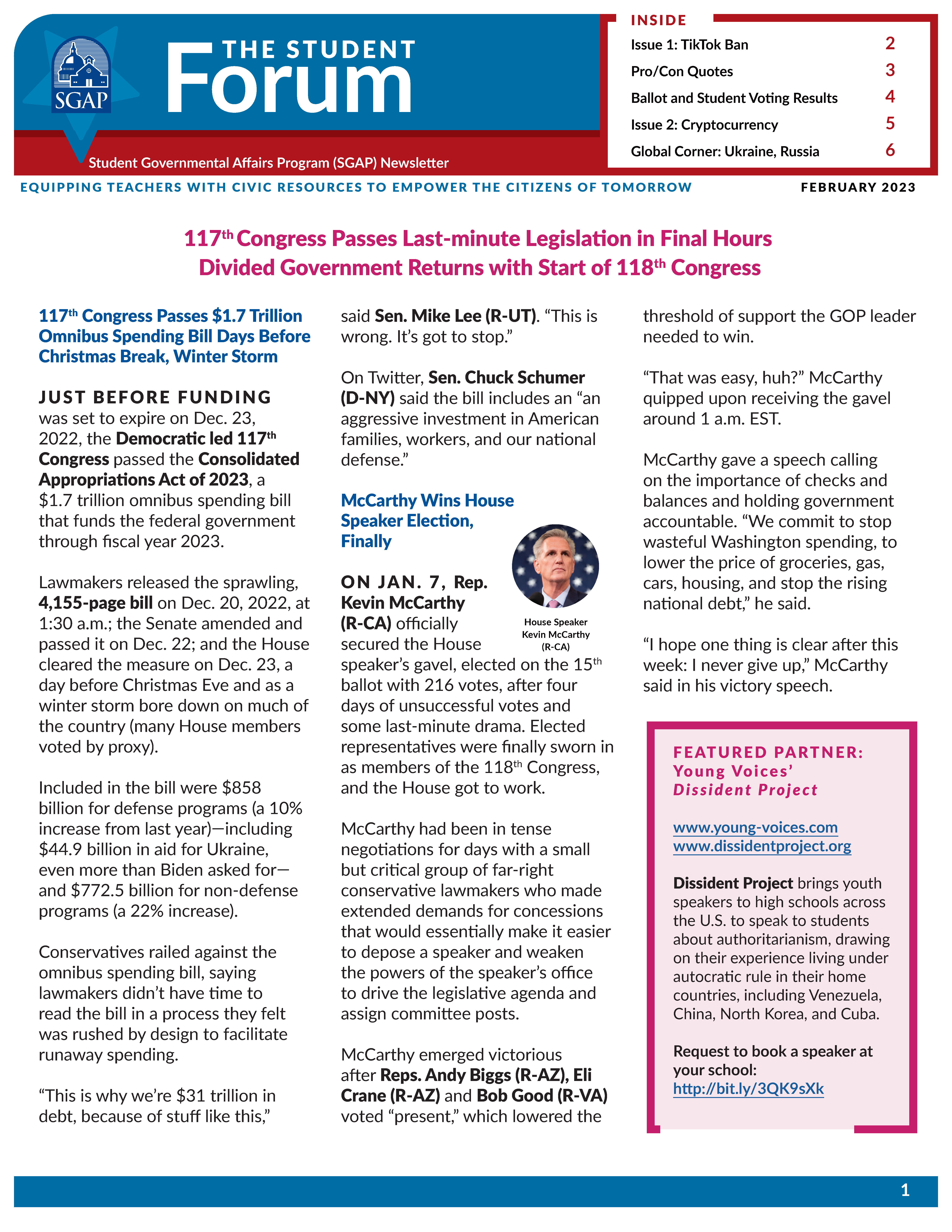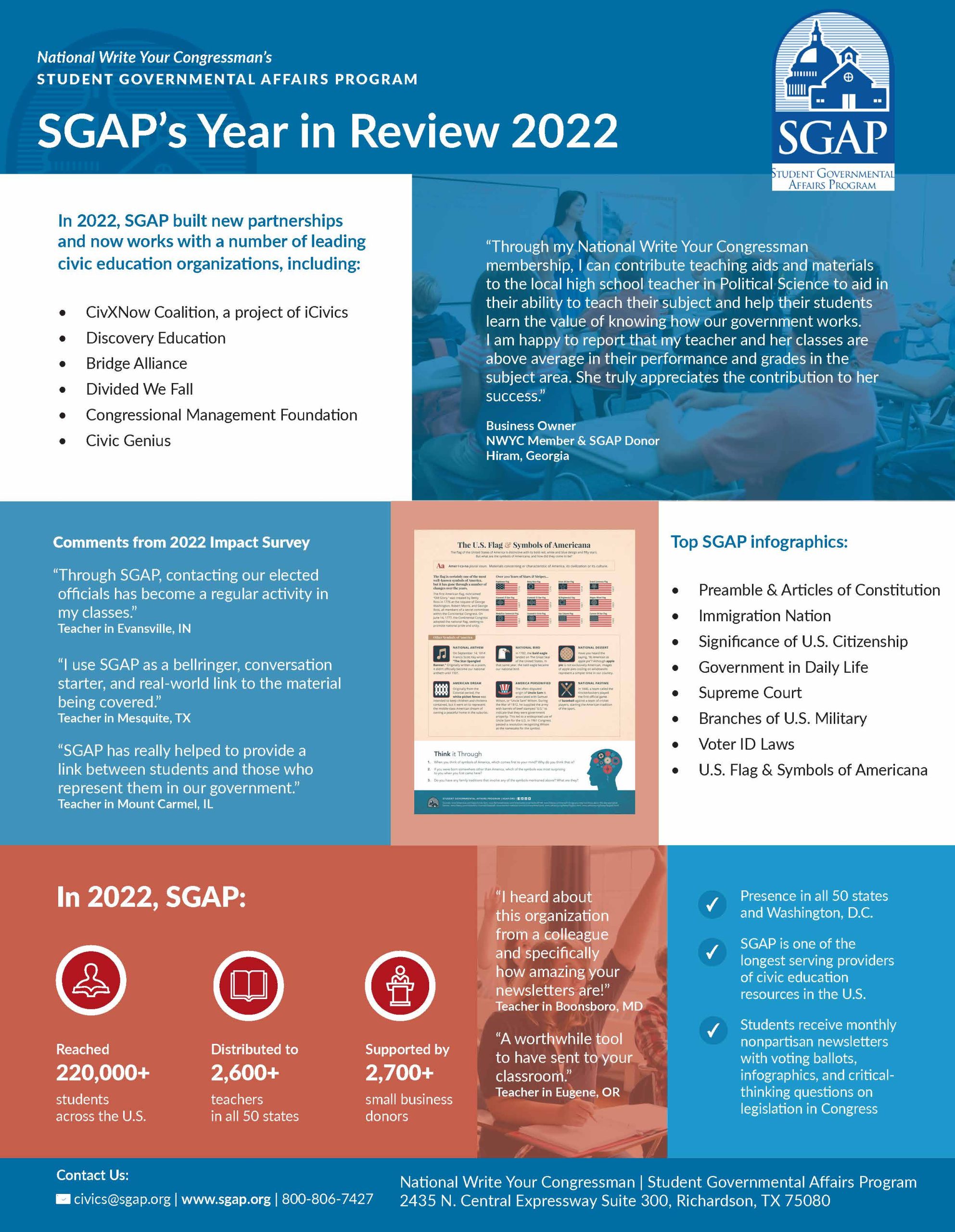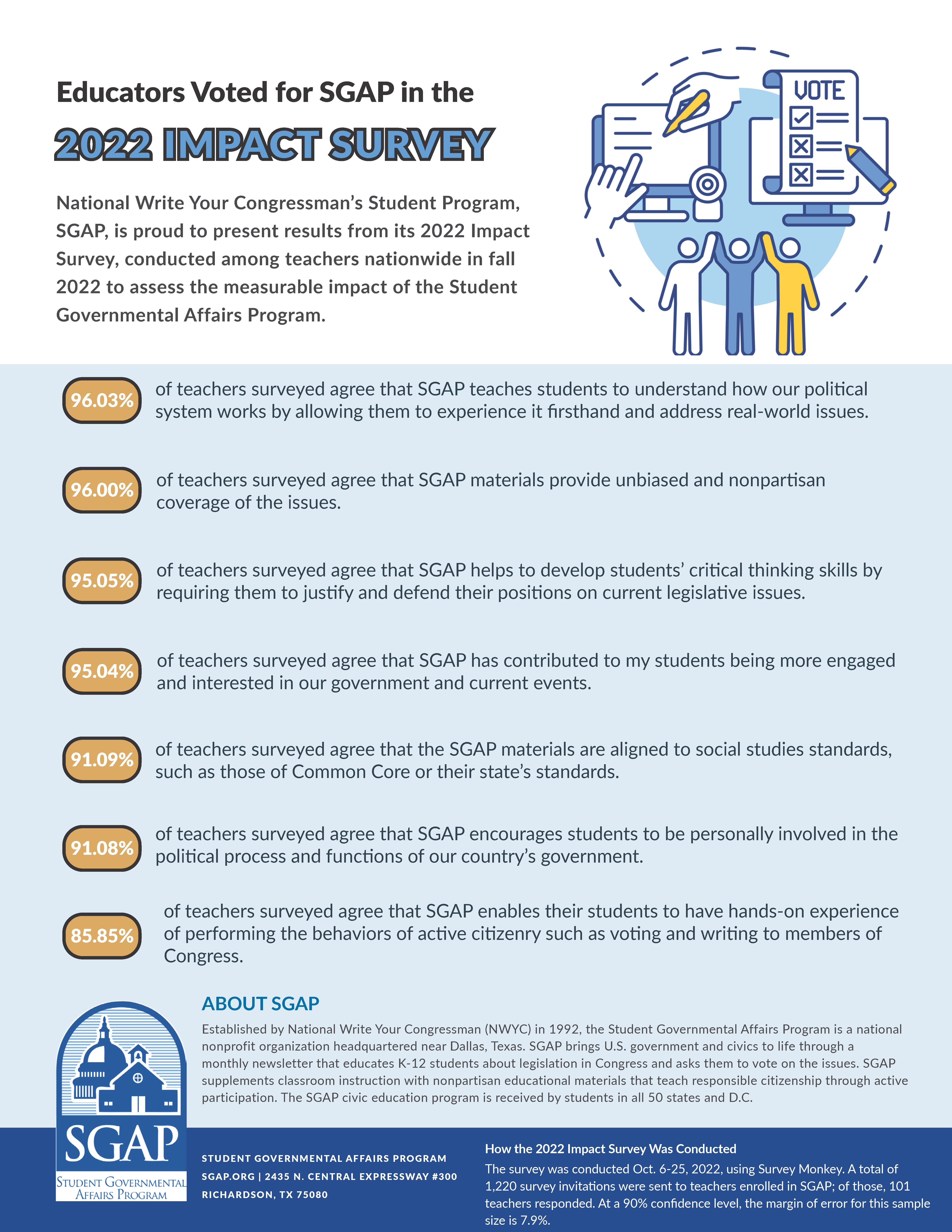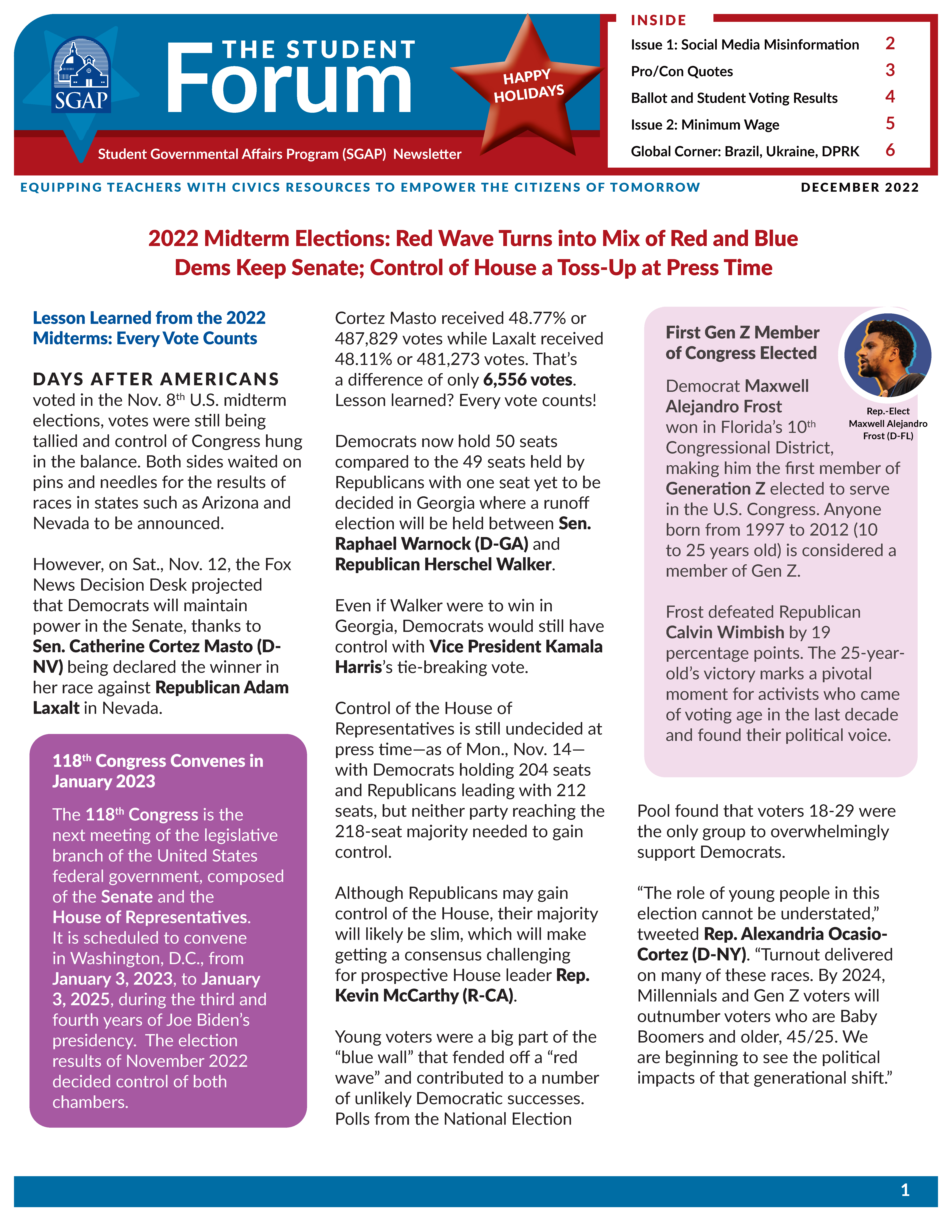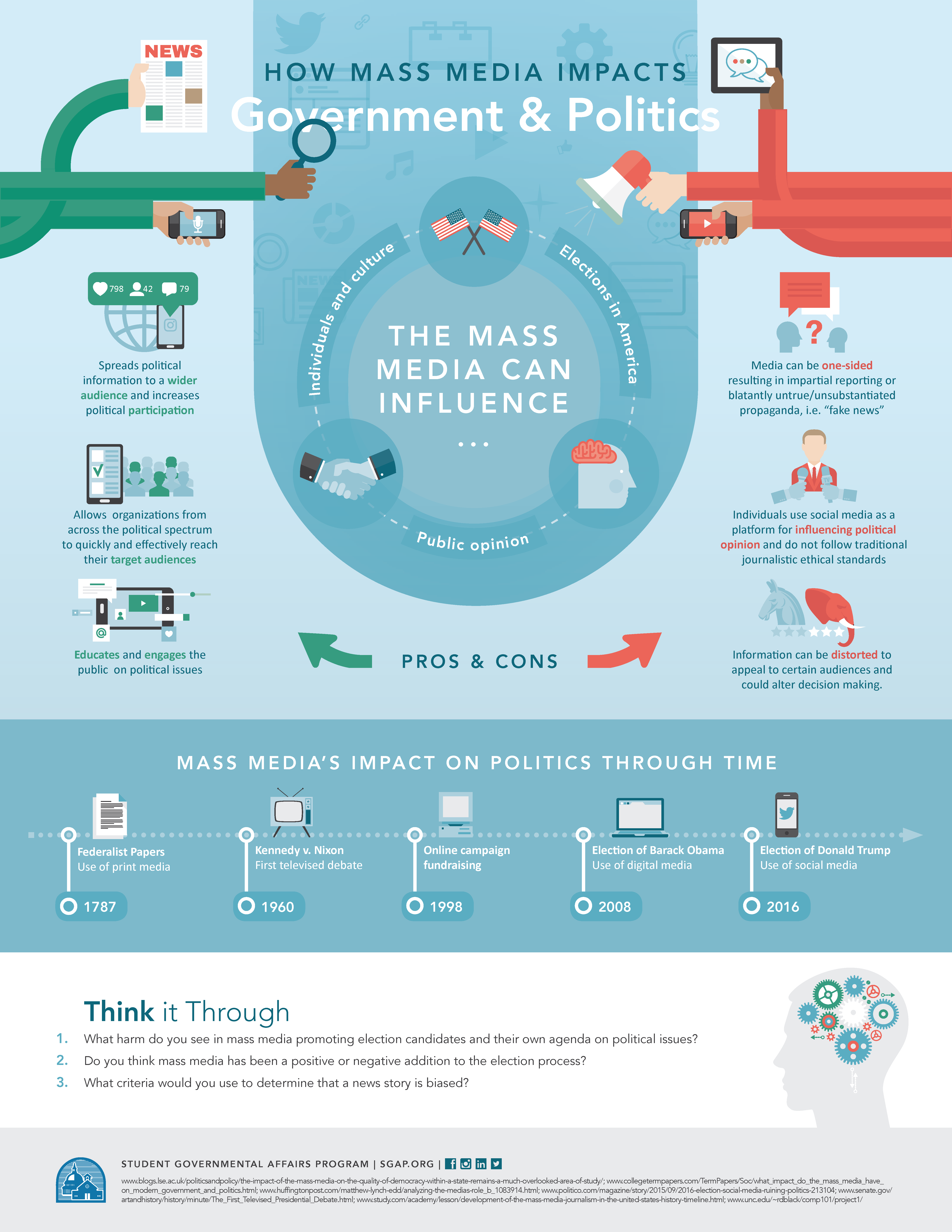[pdf-embedder url=”https://www.sgap.org/wp-content/uploads/2023/02/SGAP-Newsletter-March-2023-FINAL.pdf”]
Ideas for Teachers for March 2023
RESEARCH LINKS

THE STRATEGIC PETROLEUM RESERVE (SPR) is the world’s largest supply of emergency crude oil. Administered by the U.S. Department of Energy, these federally owned oil stocks are stored in massive underground salt domes (or caverns) along the Texas and Louisiana coastlines of the Gulf of Mexico.
Issue 1: Strategic Petroleum Reserve
Congress.gov: H.R.21 “Strategic Production Response Act”
U.S. Department of Energy: “Strategic Petroleum Reserve Quick Facts”
WaPo: “What Is the Strategic Oil Reserve and Can It Lower Prices?”
Axios.com: “How the Strategic Petroleum Reserve Works”
Politico.com OpEd: “Tapping the Oil Reserve Is Bad Policy”
WSJ.com: “Why Is Biden Tapping the SPR and Will It Bring Lower Gas Prices?”
Issue 2: D.C. Statehood
Congress.gov: S.51 “Washington, D.C. Admission Act”
Brennan Center for Justice: “D.C. Statehood Explained”
Senate.gov: Hearing, Cato Institute Statement – “Examining D.C. Statehood”
statehoodresearchdc.org: “Democracy Deferred: D.C.’s Two-Century Struggle”
League of Women Voters: “FAQs About Statehood for the People of D.C.”
Politico: “Your All-Purpose Wonk’s Guide to Why D.C. Statehood Is So Hard”
DISCUSSION QUESTIONS
Issue 1: Strategic Petroleum Reserve
1. President Biden’s recent release of oil from the SPR succeeded in reducing the cost of gasoline for Americans. Yet the SPR has dropped to its lowest level since 1985 in less than a year. Did Biden make the right decision? Why or why not?
2. The SPR wasn’t technically designed to help the U.S. government manage the price consumers pay for gasoline, but it has been used that way by multiple administrations. Does this make it “okay” for administrations to tap into it for that purpose?
3. H.R.21 limits the drawdown of petroleum in the SPR until the Department of Energy develops a plan to increase the percentage of federal lands leased for oil and gas production. Should alternatives to oil and gas production, such as renewable energy options, also be considered as solutions? Why or why not?
4. Is releasing emergency oil reserves when there are no fuel shortages or lines at the pump worth what might come next? Is the benefit to the American public worth the risk?
5. What is your perception of President Biden’s motives for tapping the SPR to lower gas prices? Are his intentions politically motivated? Why or why not?
Issue 2: D.C. Statehood
1. How do you think the inclusion of D.C. as a state might impact the future of the country?
2. D.C. citizens pay high taxes but do not have representation in Congress. Is statehood the right solution to this problem? Why or why not?
3. If admitted, D.C. would have the highest proportion of Black residents of any state. Does this fact make D.C. statehood a civil rights issue? Why or why not?
4. What do you think? Should D.C. become a state? Explain your reasoning.
5. What are the arguments for and against D.C. statehood? Which do you believe are the strongest, and which are weaker?
SGAP Newsletter for March 2023 (Petroleum Reserve + DC Statehood)
2022 SGAP Student Voting Results Infographic
SGAP Newsletter for February 2023 (TikTok Ban + Cryptocurrency)
Ideas for Teachers for February 2023
RESEARCH LINKS
Issue 1: TikTok Ban

SINCE ITS LAUNCH, TIKTOK has become a popular meeting place for under-25-year-olds, but recently the social media app is the subject of a slew of state bans and a U.S. national security probe.
Congress.gov: “S.5245 – ANTI-SOCIAL CCP Act”
Rubio/Gallagher OpEd: “TikTok, time’s up; app should be banned in America”
WSJ.com: “Senate Passes Bill Banning TikTok From Government Devices”
Gizmodo.com: “TikTok Owner Admits Employees Accessed Data of U.S. Users”
TheHill.com: “Lawmakers introduce bill to ban TikTok in U.S.”
Reuters.com: “U.S. lawmakers unveil bipartisan bid to ban China’s TikTok”
TheGuardian.com: “Revealed: How TikTok censors videos don’t please China”
Issue 2: Cryptocurrency
Congress.gov: “S.4760 Digital Commodities Consumer Protection Act of 2022”
Overview: “The Digital Commodities Consumer Protection Act Closes Gaps”
Marketplace.org: “Your questions about cryptocurrency answered”
cnbc.com: “Congress considers crypto consumer protection bill SBF backed”
Thomsonreuters.com: “Why the crypto economy needs stricter regulations”
coinmarketcap.com: “Impact of FTX’s Collapse Will Go Beyond Its Customers”
DISCUSSION QUESTIONS
Issue 1: TikTok Ban
- Although they’re owned by the same company, China’s version of TikTok offers a child-friendly version, with educational videos and a time limit that isn’t offered in the U.S. Do you think it’s possible China is using TikTok to influence a generation of American youth with malevolent motives?
- Should TikTok be banned in the U.S.? Why or why not? If not, what alternative solutions do you suggest?
- U.S. lawmakers fear TikTok has become a tool for the dissemination of Chinese propaganda. In fact, sources have claimed that the Islamic State is posting propaganda on the app. Do these facts change your opinion of the situation? Why or why not?
- Is TikTok merely a fun video app, or something more insidious? If you were a parent, would you allow your kids to use the app? Why or why not?
- The app contains a great deal of private information about American users and this information is stored offshore. Is TikTok a threat to national security? Is it futile to worry about Chinese government surveillance in an age where all big tech companies (and the U.S. government) are spying on us anyway?
Issue 2: Cryptocurrency
- Some people believe that cryptocurrencies such as non-fungible tokens (NFTs) are the new financing of the future. Do you agree? Why or why not?
- Certain lawmakers, such as Sen. Elizabeth Warren (D-MA), say cryptocurrencies need more regulation. What are the concerns about regulation, or lack thereof, and what do you think needs to be done?
- Warren says digital currency is not a “good way to buy and sell things and not a good investment and is an environmental disaster.” Is she correct?
- Should cryptocurrencies have to abide by the same regulations as securities, or should new rules be devised?
- Given the current lack of regulations on cryptocurrencies, would you feel safe investing all or part of your savings in it? Why or why not?
SGAP Year in Review 2022
2022 Impact Survey Flyer
SGAP Newsletter for December 2022 (Social Media + Minimum Wage)
Ideas for Teachers for December 2022
RESEARCH LINKS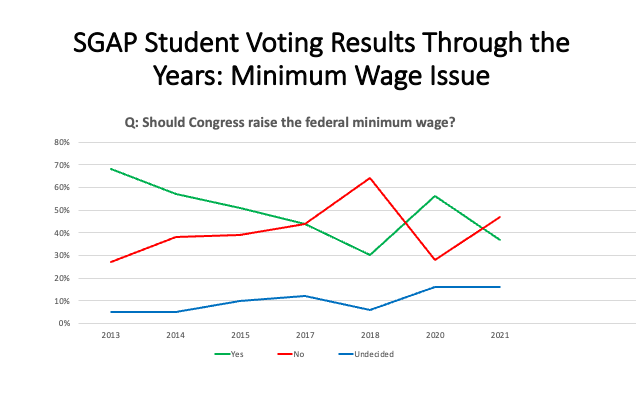
Issue 1: Social Media
Medium.com OpEd: “Section 230 – Mend It, Don’t End It”
National Review: “Elon Musk and the Third Era of Social Media”
“Communications Decency Act Pros and Cons”
Electronic Frontier Foundation: “Section 230 of the Communications Decency Act”
Lawfare Blog: “Supreme Court … Gonzalez v. Google and Twitter v. Taamneh”
NPR: “Democrats Hold Social Media Companies Responsible Health Misinformation”
Issue 2: Minimum Wage
Congress.gov: “H.R.603 – Raise the Wage Act of 2021”
House.gov: “Top Democrats Introduce Bill Raising Minimum Wage to $15 by 2025”
Senate.gov: “Raise the Wage Act of 2021 Fact Sheet”
Department of Labor: “History of Changes to the Minimum Wage Law”
Economic Policy Institute: “Why America Needs a $15 Minimum Wage”
raisetheminimumwage.com: “Letter to Congress Support Raising Minimum Wage”
DISCUSSION QUESTIONS
Issue 1: Social Media
- If the government were to have censorship authority over social media platforms, would that result in the protection of Americans’ rights or loss of them? Explain your reasoning.
- In your own experience with social media, have you encountered rude or abusive behavior from others? If so, what do you think is a good solution to this problem?
- Should the social media platform itself be responsible for the comments of users? Why or why not?
- How does the Bill of Rights’ First Amendment protect free speech in the U.S.?
- Do you believe Section 230’s protections for big tech companies need to be revised? How would you revise them?
Issue 2: Minimum Wage
- Do you support or oppose raising the federal minimum wage? If you were speaking to a person who disagreed, what is the strongest argument in support of your position?
- If you were a business owner, would you want the minimum wage to increase? Why or why not?
- What are two arguments against raising the minimum wage? What are two arguments in favor of raising the minimum wage?
- How would a minimum-wage worker’s life be changed as a result of lifting the minimum wage from $7.25 per hour to $15 per hour?
- Places like New York, Oakland, San Francisco and Seattle have raised the minimum wage in their cities. Why do you think these places have raised their municipal minimum wage?
How Mass Media Impacts Government and Politics Infographic
Teacher Spotlight on Elizabeth Randolph (Post, TX)
Snapshot
Name: Elizabeth Howard Randolph, M.Ed.
School Name: Mullin Garza County
School Location: Post, TX
Subject(s) Teaching: Social Studies (History, Geography, Government, & Economics)
Grade(s) Teaching: 8th–12th Grade
No. of Years Teaching: 16
Elizabeth Howard Randolph, M.Ed., has been teaching social studies to middle and high school students at Mullin Garza County for the past eight years, which represents half of Randolph’s 16-year teaching career. Located in the small town of Post, Texas, Garza County Regional Juvenile Center is a secure lockdown facility which provides residential treatment, sex offender treatment, counseling and therapy, and detention for pre-adjudicated youth.
Youth Making Their Voices Heard
Nearly all of Randolph’s students have been through the court system, and, yes, teaching in a correctional setting can be difficult, she admits. “The kids here are more of the at-risk and marginalized type students,” Randolph adds. “A lot of times their only experience with government has involved being prosecuted. They don’t understand how the government works and, more importantly, they don’t understand their role in the government process or where and how to make their voice heard.”
That is where the SGAP newsletter comes in. Randolph says she uses the SGAP program to help meet some of the civic knowledge requirements of her state’s standards—the Texas Essential Knowledge and Skills or TEKS, which are like the Common Core standards, only more specific to Texas, Randolph says.
“Using the SGAP newsletter, students are asked to formulate an opinion on one of the topics and they will write about it based on facts and details,” Randolph says. “These students have some pretty strong feelings, so guiding them to use their voice in effective ways makes a huge difference. I emphasize that we choose to give our government some of our autonomy so that they can protect our rights, and that the purpose of this is so that we are able to live with the maximum levels of autonomy possible while being safe to live freely.”
Promoting a Positive Environment
To create a welcoming environment for her students, Randolph spends the first week of the school year establishing the ground rules for her classroom. “We have two classroom rules that are non-negotiable: Treat yourself and others with respect, and behave with dignity and self-control,” she says. “I introduce the philosophies of natural and unalienable rights and emphasize that each student is intrinsically valuable, which some of these kids have never been told.”
To instill a sense of pride in her students and encourage them to see themselves as a community of learners, Randolph buys students the supplies they need to succeed and takes care to decorate her classroom according to the season. “This makes a huge difference to kids who are used to getting the bare minimum,” she says.
Randolph keeps her classroom an open and inviting place to learn, so students feel emotionally safe enough to express their opinions on the issues and current events discussed in class. “We need to stress civic engagement and participation at all levels, and we need to teach our children to hold their leaders accountable,” Randolph says. “It is critical to teach our children to have civil discourse and discussion with others. We have lost the ability to disagree with others and still be civil.”
At the end of the school year, when she will say goodbye to her students, Randolph hopes they will use everything they learned in social studies class to make the world a better place. “I hope they remember that they are intrinsically valuable just because they are humans,” she adds. “I hope they learn to value themselves and others, and that they absolutely make the world better.”


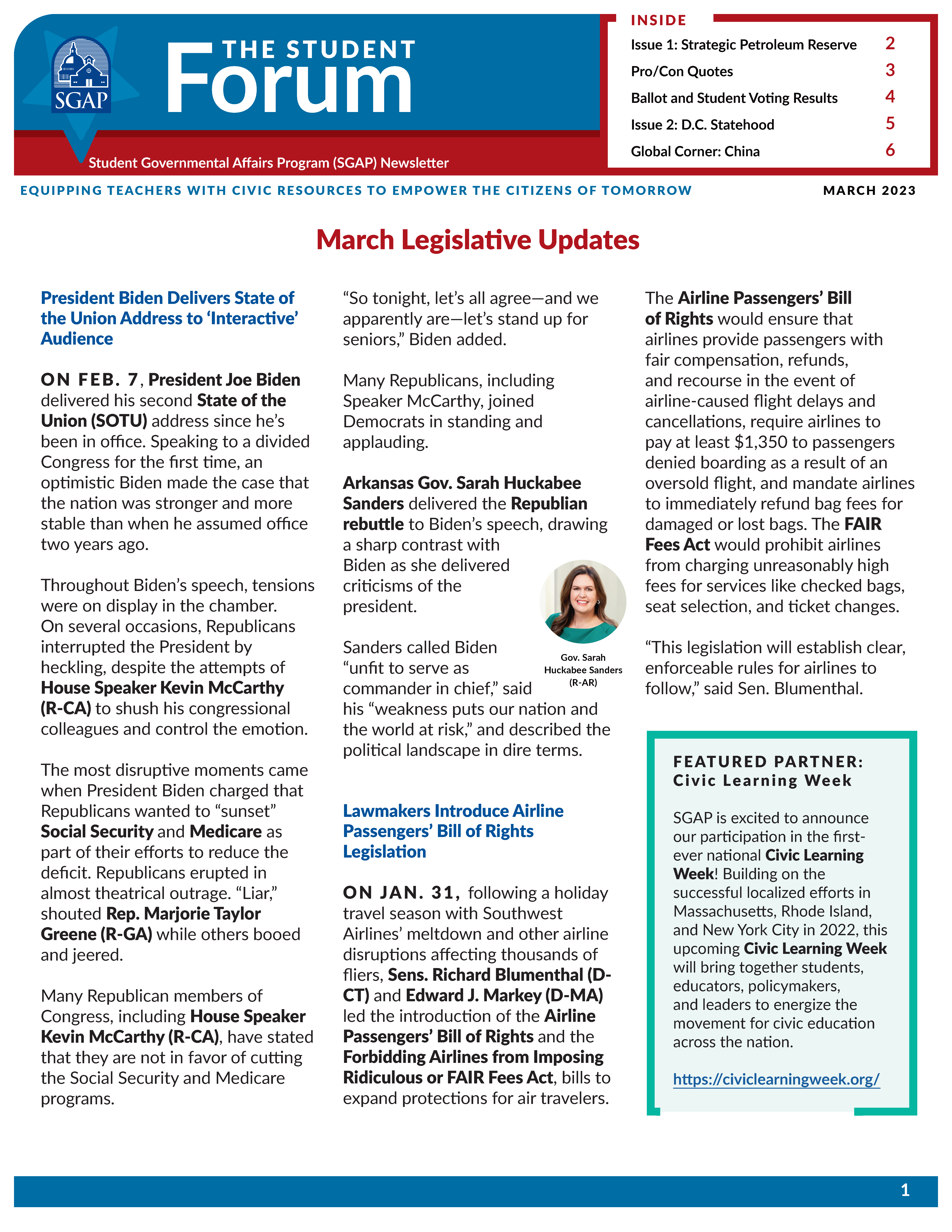 Note: To open, view and download the PDF, right click on the above image and select “open in new tab.” Thanks.
Note: To open, view and download the PDF, right click on the above image and select “open in new tab.” Thanks.